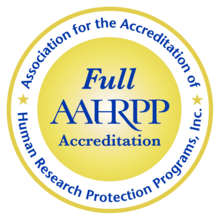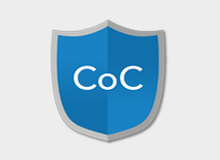Breadcrumb
- Home
- Get Help
- Newsletters
- January 2024 IRB Connection Newsletter
January 2024 IRB Connection Newsletter
What is AAHRPP Accreditation?
Certificate of Confidentiality: What are They and Why do They Matter?
Two Recent FDA Guidance Documents
Student PI Training Requirement: Reminder to Faculty Advisors and Student PIs
Learning Opportunity: Human Subjects Research, IRB Review Process, and HawkIRB
Reminder: Complete the Pre-Grant Submission Survey for Single IRB Model
Division of Sponsored Programs Rebroadcast: NDA Winter Data Submission Cycle
Division of Sponsored Programs Rebroadcast: NIH Policy for Data Management and Sharing
Recent IRB Presentation Recording Available
In the News
What is AAHRPP Accreditation?
By Emily J. Shultz, CIP
In 2024, the University of Iowa Human Research Protection Program will apply for re-accreditation from the certifying body, the Association for the Accreditation of Human Research Protection Programs (AAHRPP). The University of Iowa Human Research Protection Program (HRPP) is proud to have been the first academic institution to achieve accreditation in 2003.
Application Process
As in past years, the Human Subjects Office (HSO) will lead the accreditation process for the University of Iowa. The accreditation review encompasses the institution’s entire HRPP, including not only the Human Subjects Office, but also boards, committees and core facilities that have an interest in the research enterprise, including researchers and research teams. According to AAHRPP, “organizations must demonstrate that the entire HRPP meets accreditation standards—and that protecting research participants is a shared organizational priority.”
The process of accreditation requires submission of documents to the accrediting body, which is then followed by a site visit. During the site visit, reviewers will come to Iowa to conduct additional document review. They also conduct interviews with members of the research enterprise, which includes Institutional Review Board (IRB) members, HSO staff, researchers, and research teams, as well as members of committees with research oversight responsibilities, such as:
- Medical Radiation Protection Committee
- Pharmacy & Therapeutics Committee
- Institutional Biosafety Committee
- Nursing Research Committee
- Division of Sponsored Programs
- Conflicts of Interest in Research Committee
Why does the institution go through accreditation?
Federal agencies provide regulations and guidance about the conduct of human subjects research, but the descriptions tend to be fairly broad. For example, both the Department of Health and Human Services (45 CFR 46.108(a)(3)) and the Food and Drug Administration (21 CFR 56.108(a)) regulations require each IRB to establish and follow written procedures for initial and continuing review, reporting findings to the investigator, determining the length of time for IRB approval and ensuring prompt reporting to the IRB.
While these regulations require that an institution have policies and procedures regarding the protection of human research subjects, they do not provide specifics as to how these written procedures should be crafted and utilized. Institutions are expected to establish their own policies and procedures. Through the AAHRPP accreditation process, an organization will have expert oversight and recommendations on how to improve or amend current policies and practices.
The Value of AAHRPP Accreditation
During the AAHRPP accreditation process, experts review an institution’s human research protections program (HRPP) policies and procedures and provide feedback, a list of “best-practices,” and suggest changes that help the institution to ensure the highest standards of research ethics.
For the broader research community at the University of Iowa, AAHRPP accreditation matters in several important and impactful areas:
Recognition - Sponsors and funders recognize that AAHRPP-accredited organizations have more efficient operations, provide more comprehensive protections, and produce high-quality data. Virtually all sponsors require independent IRBs to be AAHRPP accredited. Some sponsors also consider accreditation status when choosing investigative sites.

- Collaboration - Reliance agreements and collaborative research have been expanding exponentially over the last few years. AAHRPP accreditation creates a foundation of accepted expertise and compliance that promotes trust among research organizations and is often a requirement for collaboration (E.g., The University of Iowa will not enter into reliance agreements with another institution if it is not AAHRPP accredited.)
- Quality - AAHRPP accreditation has become the norm for quality research programs. All major U.S. independent institutional review boards (IRBs) are AAHRPP accredited. More than 60 percent of U.S. research-intensive universities and 65 percent of U.S. medical schools are either AAHRPP accredited or have begun the accreditation process. Increasingly, organizations that have not earned AAHRPP accreditation are being asked, “Why not?”
- Innovation - AAHRPP-accredited institutions have the opportunity to benefit from their common commitment to continuous quality improvement. Professionals in the fields of human subjects research protections share innovative practices and data to help establish benchmarks and to be continuously assessing quality improvement.
- Compliance - To maintain a vital, safe, and cutting-edge research organization, compliance means supporting human subject protections, maintaining scientific standards and avoiding unnecessary delays. AAHRPP-accredited organizations tend to have clear, effective policies and procedures which lead to better record-keeping, prompt reporting and adherence to protocol; all of which reduces the likelihood of costly shutdowns and problematic inspections.
The next article in the AAHRPP Accreditation series will provide an overview of how institutions prepare for accreditation.
The information for this article was adapted from the AAHRPP website.
Certificates of Confidentiality: What are They and Why do They Matter?
By Emily J. Shultz, CIP
A Certificate of Confidentiality (CoC) provides wider protections for participant data in a research study that collects sensitive identifiable information. The National Institutes of Health (NIH) and other federal agencies issue certificates to provide additional confidentiality protections beyond the standard protections for human subjects research.
NIH does not issue a physical certificate for NIH-funded research projects. The NIH CoC Policy, Notice of Award, the NIH Grants Policy Statement for grant awards, and the NIH DGS Contract Handbook- Special Contracts Requirements for R&D Contracts, provides documentation of the CoC protection.
What does a Certificate of Confidentiality do?
The protections under the Certificate of Confidentiality function by prohibiting the investigator or institution from disclosing or providing covered information to:
Any federal, state, or local civil, criminal, administrative, legislative, or other proceeding (such as a subpoena); or

- Any other person not connected with the research.
The only circumstances when an investigator overseeing a study with a Certificate of Confidentiality may disclose identifiable, sensitive information are in the following circumstances:
- If required by other Federal, State, or local laws, such as for public health reporting of communicable diseases or child or elder abuse reporting.
- If the subject consents
- For the purposes of scientific research that is compliant with human subjects’ regulations (For example, sharing secondary data with another researcher.)
What does the Certificate of Confidentiality protect?
Certificates of Confidentiality protect information, documents, and/or biospecimens that contain identifiable, sensitive information related to a participant.
The Certificate of Confidentiality policy and 42 U.S. Code §241(d) define identifiable, sensitive information as information that is about an individual and that is gathered or used during the course of research where the following may occur:
- Through which an individual is identified; or
- For which there is at least a very small risk, that some combination of the information, a request for the information, and other available data sources could be used to deduce the identity of an individual.
Certificates of Confidentiality (COC) are automatically issued by the National Institutes of Health (NIH) for studies funded by the agency to provide additional protections for participants who are participating in a research project that collects sensitive data. However, the IRB is tasked with ensuring the CoC criteria are appropriately applied to the research. Several non-NIH agencies, including the Centers for Disease Control, the Food and Drug Administration, and others, also issue Certificates of Confidentiality. Studies that are not funded by the NIH (or other HHS agency) may apply to the NIH for a Certificate of Confidentiality.
What are the researcher and institutional responsibilities?
Investigators and institutions have several responsibilities associated with the Certificate of Confidentiality, including:
- Informing participants about the CoC (which is accomplished by language added to the consent document)
- Providing justification to the IRB on why the research meets the CoC requirements
- Not releasing participants identifiable, sensitive information except under limited circumstances
- Upholding the CoC protections
- Informing investigators and institutions receiving a copy of protected information about the CoC protections.
For more information about researcher and institutional responsibilities, go to https://grants.nih.gov/policy/humansubjects/coc/information-institutional-responsibilities.htm
HawkIRB Application
To identify the CoC in a HawkIRB application, the researcher should:
- Indicate “Yes” in Section X.7 if a research project has applied a Certificate of Confidentiality.
- In X.8 provide the rationale or justification for how the study design fulfills the NIH requirements to apply a CoC.
- In Section VIII.2, describe use of the Certificate of Confidentiality to minimize risks to human subjects.
- Additionally, include the template Certificate of Confidentiality language from the Appendix of the Informed Consent Document Template in the What About Confidentiality section.
Two Recent FDA Guidance Documents
In December 2023, the Food and Drug Administration (FDA) released two announcements about guidance documents:
Master Protocols for Drug and Biologic Product Development (Draft Guidance)

This document clarifies the FDA’s guidance on the design and analysis of trials conducted under a master protocol as well as the submission of documentation to support regulatory review. A master protocol includes multiple sub-studies, which may have different objectives and involve coordinated efforts to evaluate one or more medical products for one or more diseases or conditions within the overall study structure. Many types of trials can utilize a master protocol, but this guidance focuses primarily on:
- Umbrella trials - evaluate multiple products concurrently for a single disease. [Note: these are different from an umbrella project model for a HawkIRB application described in the UI IRB Standard Operating Procedures and Researcher Guide, Section II, Part 17, and in the Umbrella Project Educational Tool.]
- Platform trials - evaluate multiple products for a single disease in an ongoing manner, with products entering or leaving the platform over time.
The considerations in this draft guidance apply to a range of therapeutic areas. Compared with stand-alone trials under separate protocols, a master protocol may offer certain advantages by leveraging a shared control arm and other shared protocol elements (e.g., visit schedule, measurement procedures), shared infrastructure (e.g., recruitment efforts, network of clinical sites, central facilities, central randomization schedule, data management systems), and shared oversight (e.g., steering committee, data review committee). A master protocol may be useful in settings where subject recruitment is challenging.
For more information and to submit a comment about this draft guidance, please visit Master Protocols for Drug and Biological Product Development; Draft Guidance for Industry; Request for Comments.
Digital Health Technologies for Remote Data Acquisition in Clinical Investigations (Final)
This guidance provides recommendations on the use of digital health technologies (DHTs) to acquire data remotely from participants in clinical investigations that evaluate medical products. DHTs for remote data acquisition in clinical investigations can include hardware and/or software to perform one or more functions. Depending on the intended use, DHTs may meet the definition of a device under the Federal Food, Drug and Cosmetic Act.
Use of DHTs as recommended in this guidance may improve the efficiency of clinical trials for sponsors, investigators, and other stakeholders and may increase the opportunities for individuals to participate in research and make participation more convenient.
Student PI Training Requirement: Reminder to Faculty Advisors and Student PIs
Graduate and Undergraduate student Principal Investigators (PIs) are required to view recorded HawkIRB trainings about the New Project form (Parts 1 and 2) to learn how to navigate in the HawkIRB system and prepare thorough, detailed HawkIRB applications.

Implemented in August 2021, this policy is intended to improve the quality of HawkIRB submissions and ensure the efficiency of the IRB review process for all IRB applications.
See the September 2022 IRB Connection Newsletter for a full description of the student PI training requirement. We ask faculty advisors and others who work with student Principal Investigators to please make sure graduate and undergraduate student PIs know to complete this training in the IRB ICON Course for Researchers.(link sends e-mail)
Learning Opportunity: Human Subjects Research, IRB Review Process, and HawkIRB
By Rachel Kinker, MPA
Do you work with or teach individuals who are new to the University of Iowa and learning to conduct human subjects research? The IRB Education & Outreach Program offers presentations on human subjects research and the IRB review process to research methods courses, journal clubs, research teams, and other groups. Read on to learn how the HSO can help you educate new researchers!
We now offer a recording of the general IRB overview presentation that is available in the IRB ICON Course for Researchers. This presentation provides an orientation to the UI IRB and the IRB approval requirements for human subjects research and is an excellent supplemental lecture for any research methods or responsible conduct of research course. The presentation is ideal for students/trainees doing research as a course requirement or as an honor’s, master’s or doctoral dissertation.
This presentation covers:

- Guidelines for human subjects research: why and when IRB approval is required
- Basic ethical principles for the conduct of human subjects research
- Student Principal Investigator (PI) training requirements
- What to expect from the IRB review process
- Research off-campus or outside the United States
- Course-related student projects
Please note: We can tailor the presentation to include an orientation to HawkIRB, focus on specific aspects of research activities that are unique to the group, or just offer an open question-and-answer session about the IRB and human subjects research. We will attend in person or virtually – however the group normally meets.
We recently sent out emails to instructors of research-oriented courses for Spring 2024, offering to give an IRB-related presentation. If you would like an IRB presentation for your class or group, please contact us at irb-outreach@uiowa.edu(link sends e-mail).
Reminder: Complete the Pre-Grant Submission Survey for Single IRB Model

Federal agencies require the use of a single IRB (sIRB) for federally funded research conducted at multiple sites. This means one IRB oversees research conducted at some or all study sites. The budget must include the fees for this type of IRB review, and additional approvals and agreements may be required for this type of research. Researchers can access information about UI IRB fees for budget planning.
For grant proposals to the National Institutes of Health (NIH) or any other federal agency that requires the sIRB model, complete the Pre-Grant Submission Survey prior to grant submission. Plan ahead and complete this survey well in advance if the UI IRB will serve as the lead IRB or rely on an external IRB as an expectation of the grant. In some situations, the UI IRB cannot, or will not, serve as the lead/reviewing IRB (which will impact your study’s sIRB plan or budget).
If you have questions or need any assistance, contact the External IRB Team at uirb-external@uiowa.edu(link sends e-mail).
Division of Sponsored Programs Rebroadcast: NDA Winter Data Submission Cycle
Check Your NIH Data
The National Institute of Mental Health Data Archive (NDA) provides infrastructure for sharing research data, tools, methods, and analyses to support collaborative science. If you are an investigator submitting data for the first time, please review the Data Sharing Regimen to identify the applicable Data Sharing Terms and Conditions (pdf).
Data submission can start at any time, so prepare early to allow the Data Curation team sufficient time to map your data collection instruments to the NDA Data Dictionary.
The Data Sharing Terms and Conditions states that all new NDA Collections are required to populate their Data Expected list within 6 months of the grant award start date. If you have not yet populated your Data Expected list, please email the NDA Help Desk(link sends e-mail) to alert them that you are not able to submit data on time and they can help you get on track.
Q&A with NDA

Data experts answer your specific questions about NDA in real-time.
All NDA users are encouraged to join one of the upcoming Office Hours Q&A sessions.
Check Office Hours availability on the NDA website.
NIH Data Sharing Session
NIH is collaborating with the Federal Demonstration Partnership (FDP) on a Data Management and Sharing (DMS) pilot which focuses on testing the effectiveness and usability of two DMS Plan templates.
During Town Hall #3 on December 14, NIH program officials shared their preliminary observations on the first rounds of DMS Plans submitted to NIH. They also shared information about Phase 2 of the pilot which will focus on cost principles and budgeting issues related to data sharing.
Town Hall PowerPoint Presentation (pptx)
Division of Sponsored Programs Rebroadcast: NIH Policy for Data Management and Sharing
Last year the NIH announced the Final NIH Policy for Data Management and Sharing, which took effect January 25, 2023. As of December 31, 2023, the University of Iowa had submitted approximately 450 proposals to NIH requiring a data management and sharing plan.
The UI DMS Working Group continues to monitor NIH guidance regarding the policy and provides the following resources to assist the UI research community in complying with NIH requirements for data management and sharing.
Online Resources
- UI NIH Data Management & Sharing website
- NIH Writing a Data Management & Sharing Plan
- Checklist for NIH Data Management & Sharing Plans - UI resource
Consultation and Workshops
Brian Westra, data services librarian for the UI Libraries, consults with researchers regarding good data management, from planning before a project, to managing data during research, to preserving, curating, and sharing or publishing research data. Brian conducts training for individuals, teams, departments, etc. either in person or via Zoom. Request a consultation or workshop.
Intellectual Property Considerations
NIH recognizes the importance of federally funded university research in the commercial development of inventions that benefit the public. The agency has recently released an FAQ answer that addresses concerns university inventors have about the impact that data sharing might have on their ability to obtain patent protection for inventions. If you have questions about the impact of data sharing on your ability to patent inventions, please contact the University of Iowa Research Foundation.
Reminders
At the University of Iowa, the PI is responsible for monitoring compliance with the Data Management and Sharing Plan (DMSP).
For projects involving human subjects, the informed consent document and the IRB application should be consistent with the DMSP.
When applicable, the data certification requirement for genomic data is a distinct requirement in addition to the DMSP plan.
Recent IRB Presentation Recording Available
By Rachel Kinker, MPA

The following recording is now available in “Additional Topics” section of the IRB ICON Course for Researchers:
Ask if you Need IRB Approval (12/7/23) - Topics covered include:
